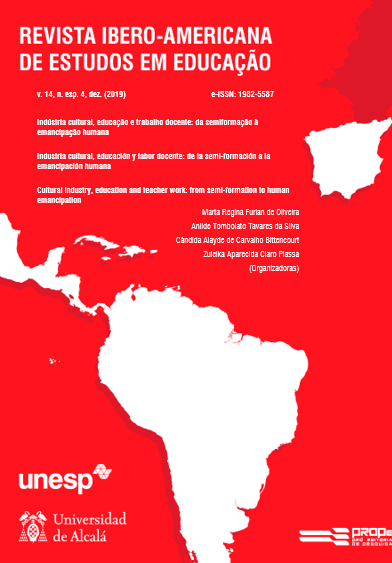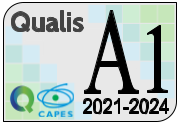Pedagogia deliberativa, linguagem e poder: emancipação e transformação social na educação pelo viés da teoria crítica
DOI:
https://doi.org/10.21723/riaee.v14iesp.4.12936Palavras-chave:
Deliberação, Argumentação, Teoria crítica, Linguagem, Práticas Educacionais.Resumo
Concebendo a linguagem como meio de dominação e de força social, que legitima as relações de poder estabelecidas institucionalmente, neste texto, objetivamos apresentar a pedagogia deliberativa como uma possibilidade presente para educar para a emancipação, e se opor à semiformação imposta pela indústria cultural em contexto educacional. Baseamo-nos na perspectiva da teoria crítica (ADORNO, 1995; MAAR, 2003), dos estudos sobre pedagogia deliberativa e nos estudos da análise crítica do discurso (FAIRCLOUGH, 2003). Enfatizamos que essa formação só pode ser alcançada por meio de processos dialéticos e dialogizantes nas práticas educacionais e que, portanto, a mediação dialógica é o principal meio que auxilia na superação de práticas que submetem os indivíduos passivamente ao processo de semiformação.Downloads
Referências
ADORNO, T. W. Educação e emancipação. São Paulo: Paz & Terra, 1995.
ADORNO, T. W. Textos escolhidos. São Paulo: Nova Cultural, 1999.
ALFARO, C. Reinventing Teacher education: The role of deliberative pedagogy in the K-6 classroom p. 143-190. In: Dientstfrey, H., Dendrick, J. R., Grattan, L. (Ed.). Deliberation and the work of higher education. Dayton: Kettering Foundation Press, 2008.
BANDEIRA, B. S.; OLIVEIRA, A. R. Formação cultural e semiformação: contribuições de Theodor Adorno para pensar a educação hoje. Educação, Porto Alegre, v. 35, n. 2, p. 225-232, maio/ago. 2012.
BAKHTIN, M. (VOLOSHINOV). The dialogic imagination: four essays by M.M. Bakhtin. Tradução Caryl Emerson e Michael Holquist. Austin: University of Texas Press, 1981.
BAKHTIN, M. (VOLOSHINOV). Estética da criação verbal. São Paulo: Martins Fontes, 1997.
BAKHTIN, M. (VOLOSHINOV). Marxismo e filosofia da linguagem: Problemas fundamentais do Método Sociológico na Ciência da Linguagem. Trad. Michel Lahud e Yara Frateschi Vieira. São Paulo: Hucitec, 2010.
BRAIT, B. (Org.) Bakhtin, dialogismo e construção do sentido. Campinas: Editora da Unicamp, 1997.
CHOULIARAKI, L.; FAIRCLOUGH, N. Discourse in late modernity: rethinking Critical Discourse Analysis. Edinbourg: Edinbourg University Press, 1999.
COLE, H. J. Teaching, Practicing, and Performing Deliberative Democracy in the Classroom. Journal of Public Deliberation, n. 2, v. 9, artigo 2, 2013. Disponível em: http://www.publicdeliberation.net/jpd/vol9/iss2/art10. Acesso em: jun. 2019
DEDRICK, J. R.; GRATTAN, L.; DIENSTFREY, H. (Org.). Deliberation and the work of higher education: Innovations for the classroom, the campus and the community. Kettering Foundation, 2008.
DOHERTY, J. Deliberative pedagogy: an education that matters. In: Connections: education for democracy. Dayton, Kettering Foundation, 2012.
EHRLICH, T. Civic responsibility and higher education. Phoenix: Oryx Press, 1999.
ENGLUND, T. Educational Implications of the ideas of deliberative Democracy. In: M. Murphy; T. Fleming (Ed.). Habermas, Critical Theory and Education (Reprint edition, p. 19-32). London: Routledge, 2012.
FAIRCLOUGH, F. Language and power. England, Longman, 1989.
FAIRCLOUGH, F. Discurso e mudança social. Brasília: UnB, 2001.
FAIRCLOUGH, F. Semiotic aspects of social transformation and learning. In: ROGERS, R. (Ed.). An introduction to critical discourse analysis in education. 2th ed. New York: Routledge, p. 119-127, 2011.
FAIRCLOUGH, F.; FAIRCLOUGH, N. Analysis and evaluation of argumentation in critical discourse analysis: deliberation and the dialectic of enlightenment, 2012. Disponível em: http://www.academia.edu/3775784/Fairclough_Isabela_and_Fairclough_Norman_Analysis_and_evaluation_of_argumentation_in_CDA_deliberation_and_the_dialectic_of_enlightenment_2012_. Acesso em: 07 jun. 2019.
FLUM, H.; KAPLAN, A. Identity formation in education settings: a critical focus for education in the 21st century. Contemporary Educational Psychology, San Diego, v. 37, n. 3, p. 171-175, 2012.
HORKHEIMER, M. Eclipse da razão. Rio de Janeiro: Labor, 1976.
HORTON, M.; FREIRE, P. We Make the Road by Walking: Conversations on Education and Social Change. Philadelphia: Temple University Press, 1990.
INGHAM, L. Introducing deliberation to first-year students at a historically black College/University. In: DEDRICK, J. R.; GRATTAN, L.; DIENSTFREY, H. (Org.) Deliberation and the work of higher education: Innovations for the classroom, the campus and the community. Kettering Foundation, 2008.
JOHN-STEINER, V. Creative collaboration. Oxford: Oxford University Press. 2000.
JOHNSON, K. Second language teacher education: a socio-cultural perspective. Routledge: Amazon, 2009.
LAVE, J. Cogntion in practice: mind, mathematics and culture in everyday life. Cambridge: Cambridge, University Press, 1988.
LEWIS, C.; KETTER, J. Learning as social interaction: interdiscursivity in a teacher and researcher study group. In: ROGERS, R. (Ed.). An introduction to critical discourse analysis in education. 2. ed. Routledge: Amazon, p. 128-153, 2011.
LIBERALI, F. C.; MAGALHÃES, M. C. C. Formação de professores e pesquisadores: Argumentando e compartilhando significados. In: TELLES, J. A. (Org.). Formação inicial e continuada de professores de língua: Dimensões e ações na pesquisa e na prática. Campinas, SP: Pontes Editores, v. 01, p. 43-66, 2009. Disponível em: https://www.academia.edu/14513803/Formação_de_professores_e_pesquisadores_Argumentando_e_compartilhando_significados. Acesso em: 20 maio 2019.
LONGO, N. Deliberative Pedagogy in the Community: Connecting Deliberative Dialogue, Community Engagement, and Democratic Education. Journal of Public Deliberation, v. 9, n. 2, artigo 16, 2013. Disponível em: http://www.publicdeliberation.net/jpd/vol19/iss12/art16. Acesso em: jun. 2019
MAGALHÃES, M. C. C.; NININ, M. O. G; LESSA, A. B. C. T. A dinâmica discursiva na formação de professores: discurso autoritário ou internamente persuasivo? / The Discursive Dynamics. In: Teacher Education: Authoritative Discourse or Internally Persuasive Discourse? Bakhtiniana, São Paulo, v. 9, n. 1, p. 129-147, jan./jul. 2014.
MARCUSE, H. Cultura e sociedade. São Paulo: Paz & Terra, v. 1, 1997.
MATHEWS D. The ecology of democracy: finding ways to have a stranger hand in shaping our future. Kettering Foundation, 2014.
MENDONÇA, R. F. Teoria Crítica e Democracia Deliberativa: diálogos instáveis. Opinião Pública, v. 19, n. 1, p. 49-64, 2013.
MORIN, E. Educação e Complexidade: os sete saberes e outros ensaios. SP: Editora Cortez, 2009.
MURRAY, T. Supporting deeper deliberative dialogue through awareness tools. Presented at Build Peace, MIT, May, 2014. Disponível em: http://socialdeliberativeskills.com/documents/FINAL_2014BuildPeace_Murray.pdf. Acesso em: jun. 2019
PEARSON, P. Incorporating democratic pedagogy into a traditional classroom and the university experience: benefitting the community and country. Honors College Capstone Experience/Thesis Projects. Western Kentucky University. 2015.
ROGERS, R. (Ed.). An introduction to critical discourse analysis in education. 2th ed. London: Routledge, 2011.
ROTH, W.; TOBIN, K. Redesigning an “urban” teacher education program: an activity theory perspective. Mind, Culture and Activity, v. 9, n. 2, p. 108-131, 2002.
RYAN, M.; BROUGH, D. Reflections around artefacts: using a deliberative approach to teaching reflective practices in fashion studies. Journal of learning design, v. 5, n. 1, 2012.
SANTOS, M. F. O. As relações de poder na interação professor-aluno, em contexto Universitário - Uma amostragem. Revista do GELNE. Ano 1, n. 1, p. 117-124, 2000.
SILVA, V. A. Adorno e Horkheimer: a teoria crítica como projeto de emancipação. 2007.
VYGOTSKI, L. S. Obras escogidas III. Madrid: Visor, 1995.
WALTON, D. Fundamentals of critical argumentation. Cambrigde University Press, 2006. Disponível em:
https://drive.google.com/file/d/0B0OLpBl81f_vZDA1MTFmMHJYWFk/edit. Acesso em: 01 jun. 2019.
Downloads
Publicado
Como Citar
Edição
Seção
Licença
Manuscritos aceitos e publicados são de propriedade dos autores com gestão da Ibero-American Journal of Studies in Education. É proibida a submissão total ou parcial do manuscrito a qualquer outro periódico. A responsabilidade pelo conteúdo dos artigos é exclusiva dos autores. A tradução para outro idioma é proibida sem a permissão por escrito do Editor ouvido pelo Comitê Editorial Científico.








